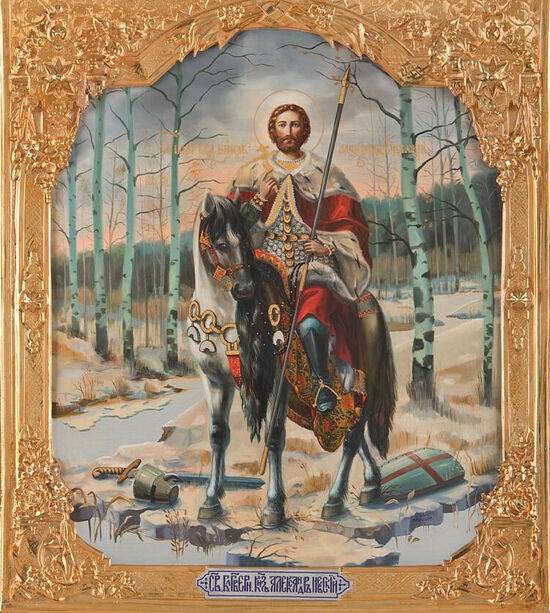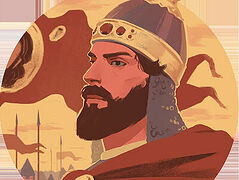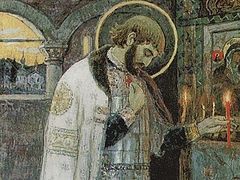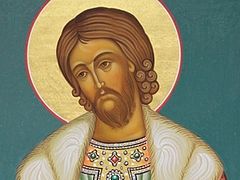This year marks the 800th anniversary of the birth of the holy Right-Believing Grand Prince Alexander Nevsky. Clerics, public figures, and academics pay tribute to his merits, but they mostly talk about the conservative character of his activities, sometimes not noticing that the holy Prince Alexander Nevsky, who had to solve the problem of preserving Rus’, was at the same time, in the depth of his deeds, its renovator.
In this regard, I would like to draw your attention to one episode in the Life of the Right-Believing Prince, written between 1263 and 1280 by his friend and companion, the holy Metropolitan Kirill II (also the chronicler of Prince Daniel of Galicia). When he returns victorious from the Battle on the Ice and approaches the city of Pskov,
the abbots, and priests, and all the people met him in front of the city with crosses, and gave praise to God, and sang glory to lord Prince Alexander, said: “Thou didst help the meekest David rout the foreigner, and our faithful prince, armed with the cross, to free the city of Pskov from those of another tongue by the arm of Alexander.”
Note that the text of this stichera is in the service to the holy Equal-to-the-Apostles Emperor Constantine (May 21) in a slightly modified form.
Researchers used to not pay this episode any attention, and completely without reason. Although the custom of singing victorious Church hymns is characteristic of Ancient Rus’, for example, in the Legend of the Mamai Massacre it says: “They went merrily, rejoicing, chanting hymns: Some sang to the Theotokos, others to the martyrs,” this is the only case where a stichera dedicated to a saint, especially to an Equal-to-the-Apostles Emperor, is sung in honor of a living prince. In this regard, the only possible conclusion is that the Russian people, contemporaries of the holy Right-Believing Prince Alexander Nevsky, saw in him a new St. Constantine.
You don’t have to go far for proof: The holy Equal-to-the-Apostles Prince Vladimir is called in the Sermon on Law and Grace the “likeness of Constantine the Great”… And the intersections of the life of St. Alexander Nevsky with the images of the holy Prince Vladimir and his sons—Sts. Boris, Gleb, and Yaroslav the Wise—are quite obvious. It’s worth recalling the vision of Pelgusius: “Brother Gleb, lead us to row, and so let us help our kinsman Alexander”—and also the holy Prince’s prayer before the Battle on the Ice:
Prince Alexander raised his hands to Heaven and said: “Judge me, O God, judge my strife with the unrighteous people and help me, Lord, as in ancient times Thou didst help Moses to defeat Amalek, and our great-grandfather Yaroslav—the accursed Svyatopolk.”
We see here the same idea of God’s Judgment as in Psalm 34: Judge thou, O Lord, them that injure me, fight against them that fight against me, with which the holy Prince Alexander went to the Battle of Neva, and a similar comparison of the crusaders with the fratricidal Svyatopolk the Accursed. There’s another image here, taken from Exodus—Moses and Amalek. On the one hand, Prince Alexander acts as a defender of the Law of God and the Truth of God, and the crusaders are likened to the pagan Amalekites, and on the other hand, being like Moses, who held out his arms crosswise during battle, the holy Prince Alexander is a true defender of the Cross, unlike the self-styled Crusaders.1
But let’s recall the appearance of the Life-Giving Cross to St. Constantine before the decisive battle with the usurper Maxentius on the Milvian Bridge in 312, when he saw the Life-Giving Cross in the heavens and heard the words: “By this conquer.” During the battle, his enemies drowned in the Tiber, “as in the time of Moses himself and of the ancient God-beloved race of Hebrews, ‘He cast Pharaoh’s chariots and host into the sea, and overwhelmed his chosen charioteers in the Red Sea.’”2 Both the holy Emperor Constantine and his biographer Eusebius viewed the Battle of Milvian Bridge as the judgment of God.
Thus, the parallel between St. Alexander Nevsky and St. Constantine the Great is rather obvious.3 What did it mean for our ancestors and what does it mean for us?
1. St. Constantine is the founder of the Christian Empire and the “cross-bearing Empire,” as he is called in the service in his honor, apparently written by St. John of Damascus. The empire is, first of all, a sheath for the life of the New Israel—the God-loving Romans—headed by the new Moses—the Emperor, its leader into the Promised Land. It bears the name of Christ and is under the sign of the Cross. From this it’s clear that the Christian empire is called to co-crucifixion and resurrection with Christ. Accordingly, the misfortunes befalling the empire bear, in a sense, the character of the sufferings of the Cross, and its victories—the character of the Paschal celebration.
If we examine the life and work of the holy Prince Alexander Nevsky, we’ll see that, firstly, during his life he developed his realm, which encompassed nearly all of Rus’—Novgorod, Kiev, Vladimir—which he sought to administer autocratically, like a kind of tsar. Without exaggeration, the holy Prince Alexander can be considered the father of Russian autocracy. But for him, his power is a nation of truth. Let us recall his words before the Battle of Neva:
God is not in power, but in truth. Let us remember the Psalmist David: Some glory in chariots, and some in horses: but we will glory in the name of the Lord our God. They are overthrown and fallen: but we are risen, and have been set upright (Ps. 19:7-8).
The Life of St. Alexander Nevsky shows us both the cross and resurrection of Rus’.
2. The thesis, “God is not in power, but in truth,” and St. Alexander’s call not to enter into someone else’s territory is an affirmation of legality at the international level. This is a call to law and truth. He is profoundly near to the legal consciousness of St. Constantine the Great, expressed in his famous Edict of Milan. In it, on the one hand, St. Constantine bases his actions on natural law, appealing to common sense. On the other hand, natural law ultimately traces back to a supernatural source. The philosophical monotheism of the Equal-to-the-Apostles Emperor clearly has Christian features.
3. St. Alexander and St. Constantine the Great are united by the desire to preserve the Orthodox faith. When the Emperor was finally convinced of the harmfulness of the heresy of Arianism, he called an Ecumenical Council in Nicaea to condemn it, despite all the risks, troubles, and possible losses. In 1249 or 1251, the legates Agaldad and Gemon went to St. Alexander, apparently with quite favorable offers from Pope Innocent IV—an alliance (including against the Mongols) and help, including military. However, the holy prince didn’t succumb to their advances. After the legates arrived, and after having spoken with them, he realized that Rome had no intention of conceding anything, that it wasn’t seeking any truth, that it was all about simple submission to the Pope of Rome and his delusion, and he gave the following simple, wise, and dignified answer:
From Adam to the Flood, from the Flood to the separation of tongues, from the confusion of tongues to the beginning of Abraham, from Abraham to the passage of Israel through the Red Sea, from the Exodus of the sons of Israel to the repose of King David, from the beginning of the Kingdom of Solomon to August the King, from the beginning of August and to the Nativity of Christ, from the Nativity of Christ to the Passion and Resurrection of the Lord, from His Resurrection to the Ascension into Heaven, from the Ascension into Heaven and to the Kingdom of Constantine, from the beginning of the Kingdom of Constantine to the First Council, from the First Council to the Seventh—all that we know well, but we don’t accept any teachings from you.
In other words, we are sufficiently instructed in Divine truth, and we accept no other faith but the teachings of the Seven Ecumenical Councils, which the Latin faith contradicts. Unlike Daniel of Galicia, the holy Right-Believing Prince Alexander wasn’t seduced by the splendor of the crown and didn’t believe in the illusory help of the West, but chose the only true path—external humiliation but internal freedom.
However, the answer isn’t so simple. First, after the Nativity of Christ, the “Kingdom of Constantine” is remembered as the beginning of a completely different era in the life of Christianity—a hint at the connection of St. Alexander with the Equal-to-the-Apostles Emperor Constantine. Second, the Councils are mentioned, from the First to the Seventh. Recall that in Byzantium, in the Roman Empire, the prerogative to convene councils belonged to the emperor, first used by St. Constantine, who convened the First Ecumenical Council. Accordingly, here too, in the holy Prince’s mention of the Ecumenical Councils, the image of St. Constantine is invisibly present: “From the beginning of the Kingdom of Constantine to the First Council, from the First Council to the Seventh.” And accordingly, the heir to this kingdom is the holy Right-Believing Prince Alexander Nevsky.
4. Finally, let’s mention another significant parallel. On his deathbed, St. Alexander accepted monasticism. Before his death, St. Constantine accepted Baptism, which in the fourth century meant for many almost the same as the schema did for people of the eighteenth century. Both holy rulers desired at the end of their lives to renounce all things earthly and to stand before God.
Let’s sum it up. The holy Equal-to-the-Apostles Emperor Constantine was a grandiose renovator of the life of the Roman Empire, placing it under the protective sign of the Cross, introducing Christian laws in it and gathering Councils against heresies, striving to make it a cross-bearing empire, a state of truth, a bulwark of true faith and righteousness. Similarly, the holy Prince Alexander Nevsky not only preserved Rus’, but he also sought to gather it, to renew it as a Christian power, as an Orthodox state, where faith and the truth of God prevailed.





